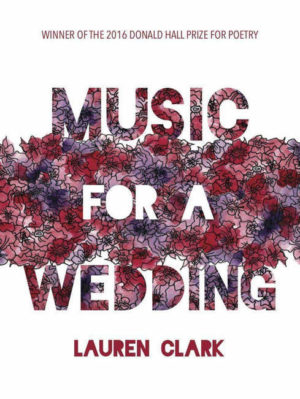In Their Own Words
Lauren Clark on “[untitled]”

[untitled]
There is a sorrow being outside your body
even when I am in the places it where it has been.
Like your kitchen, secretly and quietly
eating honey with your spoon, your spoon
which has so often been inside your mouth.
This sorrow makes me know: the vows
I said at the altar were not the real vows.
The real vows come in the middle of the night
when we wake for no reason. I am facing the wall
and you are holding me, slackly, with your body.
I ask you a question. I have not spoken it before.
And through sleep you answer—not I do, or I will,
or even yes, or silence. You say As long as I can.
And fall asleep again. I turn over and press my back
to the wall. Using my right hand, in darkness,
I measure your body beneath the sheet.
Two of my fingers, the width of your hipbone.
My whole palm, hollow between hip and cock.
So that when you are gone—and you will be gone—
I can recognize you onto some other body.
This is the vow. I will never leave you.
No. I will remake you again and again.
Sleep through it if you want to.
From Music for a Wedding (U. of Pittsburgh Press, 2017). All rights reserved. Reprinted with the permission of the author.
On "[untitled]"
I wrote [untitled] as a prayer over the course of five years. For most of those years it seemed like a throwaway, practice, an underdeveloped b-side; it was a poem that generated the beginnings of new poems and became a receptacle for odd ends of old poems. Then one day it became a home for the book's central vow: I will never leave you. No. I will remake you again and again. When I realized it was the first poem in Music for a Wedding is when the book solidified.
This poem is mysterious to me. It has corners I don't know about, or didn't when I was writing. I look back at it these years later, for example, and see how it obscures and skims over the real, common mental health struggles at the poem's heart. Secretly snacking? Charming metaphor for disordered eating. Wake for no reason? Effectually-elided PTSD nightmares, nightmares I still have as an adult in times of stress, nightmares that still scare me dead awake.
But when I was writing [untitled], I didn't know I was suffering. I didn't want others to know I was suffering. And over the years I wrote this poem I myself forgot about the nightmares, because the poem forgot the nightmares. I had to find mention of the nightmare in an old letter, after the book had gone to print, to remember it had happened. But the poem, in its silences, held space for me to return to that knowledge.
I look through all the poems from my first book and hear those booming silences around sufferings both personal and systemic. Sometimes I am ashamed to have written a book that was not explicit about what it takes, what it really looks like, to survive trauma—the trauma of a dead parent, the trauma of proximity to addiction, the trauma of being queer in a heterosexist world, the trauma of living nonbinary in a constantly sexualized body. Other times I am overjoyed by these silences: they mean that poems are coping mechanisms. Poems can on one day create a protective alternate reality, and the next call in a greater consciousness. Poems are, fundamentally, about healing. This is so beautiful.
[untitled] is the first poem of my first book, and I think I will be writing into its silences and challenges for as long as I am writing poems. Even now, writing this, I find there is another way to read the concluding vow. Maybe this vow is not intended for the person I loved so much I wrote a damn book about it—maybe the vow is for the person I was trying to love and to comfort in moments of terror and hurt. Please read this vow aloud to yourself, as kindly as you can: I will never leave you. No. I will remake you again and again. Sleep through it if you want to.



